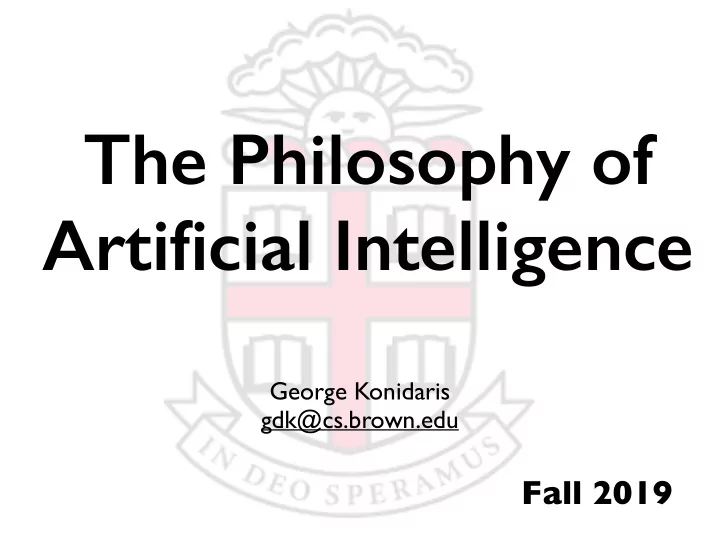

The Philosophy of Artificial Intelligence George Konidaris gdk@cs.brown.edu Fall 2019
AI: The Very Idea For as long as people have made machines, they have wondered whether machines could be made intelligent. (pictures: Wikipedia)
The Mind-Body Problem
What Are Minds Made Of? Dualism • Mind and body are two different things • Mind non-physical
What Are Minds Made Of? Materialism • Only material objects exist • Mental states are physical states “Brains cause minds” • Because of what they are: Biological naturalism • Because of what they do: Functionalism
Computation What is computation? Information processing process. •Symbols and rules for operating on symbols. •The symbols and the rules matter. •The physical substrate doesn’t matter.
Core AI Hypothesis “The brain is a computer.” = (picture: Wikipedia)
The Weak AI Hypothesis Weak AI Hypothesis: • A computer program can be built that acts as intelligently as a human. • This is about behavior . • It makes no claim about minds or even thought. • Not even about practicality: asks whether it can be done in principle. c.f. rational agent.
Turing Computing machinery and intelligence. Mind , October 1950. “Can machines think?” (picture: Wikipedia)
Turing Test A B
Objections The Theological Objection The Head-In-The-Sand Objection The Mathematical Objection The Argument from Consciousness The Argument from Various Disabilities
The Strong AI Hypothesis Strong AI Hypothesis: • A machine that behaves as intelligently as a human has a mind and is thinking. • Takes the Weak AI hypothesis as a given. • This is a claim about minds and thought . =
The Chinese Room Where’s the mind / understanding / consciousness? out in rules
The Brain Replacement Experiment
Embodied Intelligence
Questions What do we mean by: •Mind •Consciousness •Thought •Intelligence How can we explain or define subjective experience? Is it susceptible to objective analysis or definition? Can it be reproduced by a computer program?
Highly Recommended (but dated)
Recommend
More recommend